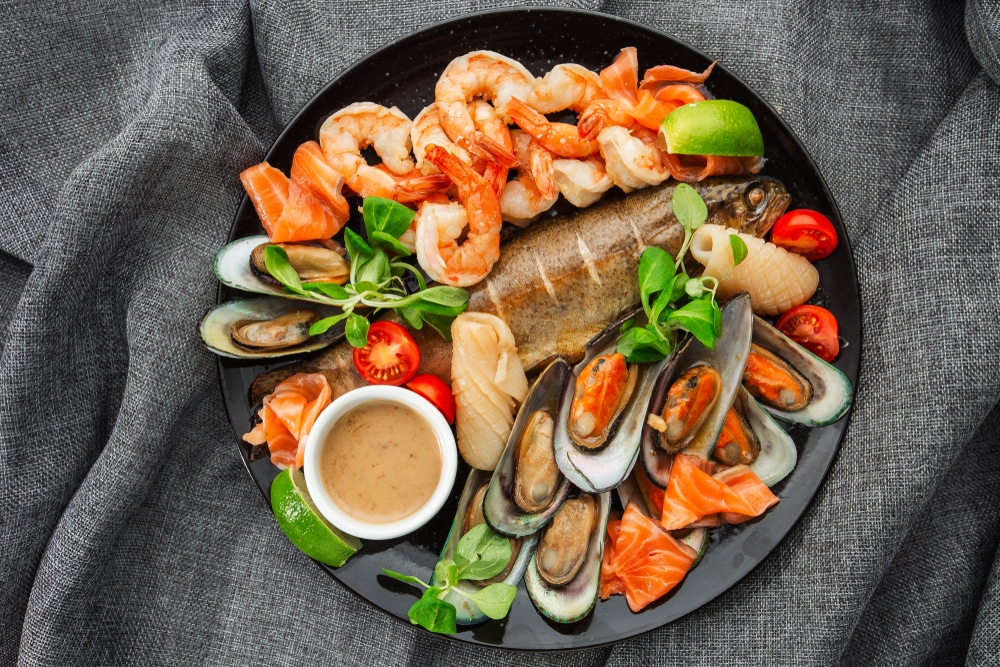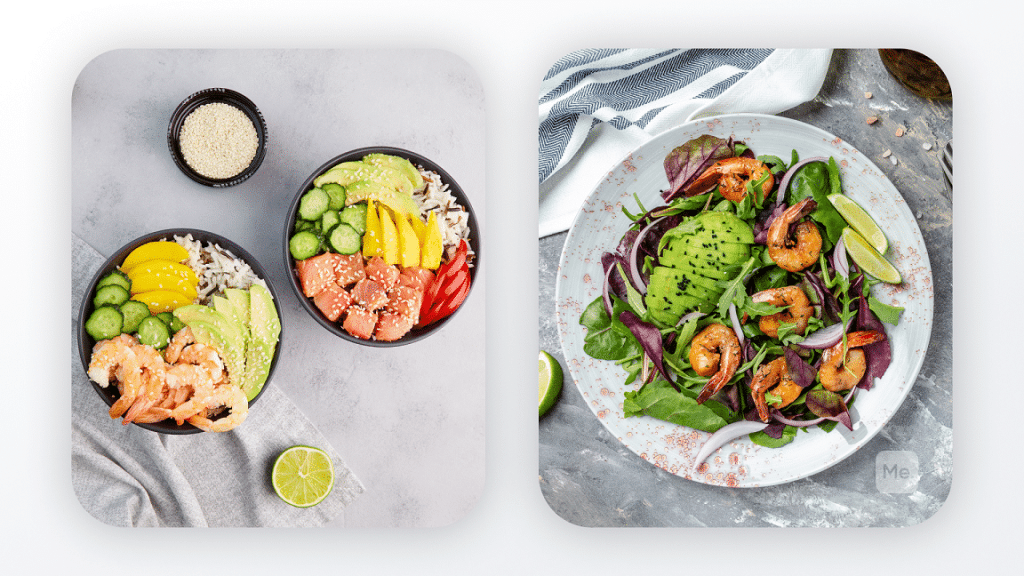When you think of seafood, what comes to mind? Is it a buttery lobster tail? A juicy shrimp skewer? A crispy fish taco? Whatever it is, seafood is delicious. But that’s not the only reason you should be eating it. Research shows that seafood has several health benefits. From muscle-building protein to heart-healthy omega-3s, seafood can help you stay healthy and strong. In this article, we’ll take a closer look at the health benefits of seafood. We’ll also provide some tips on how to incorporate more seafood into your diet.
What Are The Benefits Of Eating Seafood?
The health benefits of seafood are well-documented. Here are 11 reasons why you should make fish a regular part of your diet:
1. Source Of Lean Protein
Protein is an important macronutrient that helps build and repair tissues in the body, as well as create enzymes and hormones (1). Most animal protein sources such as beef, pork, and chicken are high in saturated fat.
Seafood, on the other hand, is a lean protein source that is lower in saturated fat.
A 3-ounce serving of beef ribeye steak contains 5 grams of saturated fat, while the same serving of cooked salmon contains only 2 grams of saturated fat (4) (5). Lean fish such as cod, tilapia, and flounder are even lower in saturated fat.
A lower intake of saturated fat is linked to a lower risk of heart disease (24). It’s also associated with a lower risk of obesity, stroke, and type 2 diabetes (23).
2. Good For Your Heart
Seafood is not only low in saturated fat, but it’s also a good source of heart-healthy omega-3 fatty acids. Omega-3s are a type of unsaturated fat that has been linked to several health benefits, including a lower risk of heart disease (17).
Omega-3s work by reducing inflammation, lowering blood pressure, and improving cholesterol levels. They also help prevent blood clots from forming (15) (20).
The American Heart Association (AHA) recommends eating two servings of fish per week, especially fatty fish such as salmon, mackerel, herring, lake trout, sardines, and albacore tuna, which are higher in omega-3s (10).
3. May Boost Brain Health
Omega-3 fatty acids may also help boost brain health. One review suggested that people who eat a diet rich in omega-3s are less likely to experience age-related cognitive decline (16).
Omega-3s are thought to promote brain health by reducing inflammation and protecting nerve cells from damage. They may also help improve blood flow to the brain (28).
4. May Reduce The Risk Of Cancer
Some studies have found that omega-3 fatty acids may help reduce the risk of cancer, especially colorectal cancer (12). Omega-3s work by reducing inflammation and cell proliferation, which are two key processes involved in the development of cancer.
Read More: Seafood Diet To Turbocharge Your Weight Loss Without Skipping On Flavor
5. Good For Joint Health
If you suffer from joint pain, seafood may help to ease your symptoms. That’s because omega-3 fatty acids can help to reduce inflammation. One study found that people with arthritis who took fish oil supplements experienced less pain and stiffness in their joints (27).
6. May Improve Sleep Quality
If you have trouble sleeping, seafood may help. Most sleep disturbances are caused by stress and anxiety, which can be reduced by omega-3 fatty acids (11).
Seafood also contains high levels of vitamin B6, which is needed for the production of melatonin, a hormone that helps regulate sleep (7).
7. Good For Your Skin
Omega-3 fatty acids are good for your skin. They can help reduce inflammation and keep your skin hydrated. Skin conditions like eczema and psoriasis are often caused by inflammation (21) (22).
Some studies have found that omega-3 fatty acids can help reduce the symptoms of these conditions (14).
8. May Help Prevent And Treat Depression
Depression is a common mental disorder that can have a negative impact on your quality of life. Some studies have found that omega-3 fatty acids may help reduce the symptoms of depression (18).
Omega-3s are thought to work by reducing inflammation and improving nerve function. They may also help to increase the levels of serotonin, a neurotransmitter that plays a role in mood regulation (18).
9. Good For Your Eyes
Omega-3 fatty acids are good for your eyes. They can help lower the risk of age-related macular degeneration, a condition that leads to vision loss. Omega-3s work by reducing inflammation and protecting the cells in the retina from damage (8).
Fish also contains Vitamin A, which is essential for good vision. Vitamin A supports protection of the cornea, the clear outer layer of the eye (13).
10. Good For Your Bones
Seafood is a good source of calcium and vitamin D, which are needed for strong bones. It’s also a good source of phosphorus, another mineral that’s required for bone health (6).
Omega-3 fatty acids may also help reduce the risk of osteoporosis, a condition that causes bones to become fragile. Omega-3s work by reducing inflammation and possibly improving bone density.
BetterMe app will kick you out of the mental funk, shake off your extra weight, rid you off your energy-zapping habits, and help you sculpt the body of your dreams. Intrigued? Hurry up and change your life for the better!
11. May Help To Prevent Alzheimer’s Disease
Alzheimer’s disease is a progressive brain disorder that leads to dementia. Some studies have found that high intakes of omega-3 fatty acids may help reduce the risk of Alzheimer’s disease (19).
Omega-3s are thought to promote brain health by reducing inflammation and protecting nerve cells from damage. They may also help increase blood flow to the brain (28).
Are There Any Side Effects Of Eating Seafood?
Most people can safely eat seafood. However, there are a few things to keep in mind.
High Levels Of Mercury In Some Fish
Seafood can contain high levels of mercury, which can harm the brain and nervous system (29). Pregnant women and young children should avoid fish which is high in mercury, such as swordfish, shark, and tilefish (9).
Allergies
Some people may be allergic to seafood. The symptoms of a seafood allergy can range from mild to severe and can include itching, swelling, and difficulty breathing (25). If you’re allergic to seafood, it’s important to avoid all fish and shellfish.
Arsenic Contamination
Seafood can also contain high levels of arsenic. Certain kinds of arsenic can cause health problems, such as skin rash, nausea, and vomiting. The arsenic in most seafood is harmless to humans. It’s important to avoid seafood that is high in inorganic arsenic, such as shellfish from certain areas that are labeled unsafe due to arsenic contamination.
High Levels Of Salt
Some types of seafood, such as smoked salmon and anchovies, can be high in salt. Too much salt can raise your blood pressure (26). If you have high blood pressure, it’s important to limit your intake of high-sodium foods.
Read More: Sea Moss And Weight Loss: Could This Seaweed Be The Key To Weight Loss?
Which Seafood Is The Healthiest?
It seems like every time you turn around, there’s a new study that touts the health benefits of seafood. So, which seafood is the healthiest?
The answer, it turns out, isn’t all that simple. Different types of seafood offer different nutrients, so it’s important to mix things up and eat a variety of seafood types to get the most benefit.
That said, there are a few seafood types that stand out as being particularly healthful. Here are some of the healthiest seafood options:
Salmon
Salmon refers to a group of fish that includes both wild-caught and farmed varieties. Atlantic salmon, chinook salmon, coho salmon, and sockeye salmon are all types of salmon.
Just like other fish, salmon contains a variety of nutrients that are good for your health. Salmon is especially high in omega-3 fatty acids, which are a type of healthy fat that has been linked to several health benefits.
Tuna
Tuna is a popular type of fish that is often consumed in canned form. There are several different types of tuna, including albacore tuna, bluefin tuna, and yellowfin tuna.
It stands out from other fish because it is relatively high in protein and low in fat. It also contains a good amount of omega-3 fatty acids.
As far as mercury content goes, tuna falls somewhere in the middle. Canned light tuna generally has less mercury than canned white or albacore tuna.
Sardines
Sardines are small, oily fish that are often eaten whole, including the bones. They are a type of herring, and there are many different varieties of sardines.
While sardines are not as high in omega-3 fatty acids like some other fish, they are a good source of this nutrient. They are also a good source of calcium and vitamin D.
Shellfish
Shellfish is a broad category that includes a variety of seafood, such as shrimp, lobster, crab, and clams.
Shellfish is a good source of protein and contains several vitamins and minerals. It is also relatively low in calories.
Some types of shellfish, such as oysters, mussels, and scallops, are especially high in certain minerals, such as zinc and selenium.
Is Seafood Good To Eat Everyday?
Yes, seafood is good to eat, even every day. It is a great source of lean protein and omega-3 fatty acids, which are essential for maintaining a healthy heart and brain.
Seafood is also low in calories and fat, making it a healthy choice for those looking to lose weight or maintain a healthy weight.
Lean and toned up body isn’t just a far-fetched fantasy. Check out the BetterMe app and watch it propel your weight loss journey into high gear!
How To Eat Seafood In A Healthy Way
Here are some tips for healthy eating of seafood:
Limit Your Intake Of Mercury-Contaminated Fish
Some types of fish, such as shark, swordfish, and tilefish, are particularly high in mercury. Mercury is a toxic metal that can damage the brain and nervous system (29).
Pregnant women and young children should avoid these fish altogether. Everyone else should limit their intake to no more than one meal per week (9).
If you are looking to eat fish more often, choose fish that are lower in mercury, such as salmon, tuna (canned light), shrimp, pollock, and catfish.
Avoid Breaded And Fried Fish
Breaded and fried fish are often high in calories and unhealthy fats. If you are going to eat breaded and fried fish, make sure to rather choose an option that is baked or grilled.
Choose Wild Caught Or Sustainably Farmed Fish
When possible, choose wild-caught or sustainably farmed fish over conventionally farmed fish. Wild-caught fish are typically lower in contaminants than farmed fish (30).
Sustainably farmed fish are raised in an environmentally friendly way that minimizes the impact on the surrounding ecosystem.
Use Healthy Dips And Sauces
If you are going to eat fish with a dip or sauce, choose one that is low in calories and unhealthy fats, such as tzatziki sauce or salsa. Avoid sauces that are high in cream or mayonnaise.
Choose The Right Accompaniment
When eating fish as a main meal, choose healthy accompaniments that will help you reach your daily nutrient goals.
Some good options include:
- A side of vegetables or a salad
- Whole grain bread or brown rice
- Fruit for dessert
Some accompaniments you should avoid include:
- French fries
- Chips
- White bread or white rice
- Sugary desserts
The Bottom Line
To sum up, there are many benefits of eating seafood. Seafood is a good source of protein, vitamins, and minerals. It’s also a good source of omega-3 fatty acids, which have many health benefits.
Seafood may help to improve your heart health, brain function, and skin health. It may also help prevent certain chronic diseases, such as Alzheimer’s disease. Most people can safely eat seafood, but there are a few things to keep in mind, such as mercury contamination and allergies.
DISCLAIMER:
This article is intended for general informational purposes only and does not address individual circumstances. It is not a substitute for professional advice or help and should not be relied on to make decisions of any kind. Any action you take upon the information presented in this article is strictly at your own risk and responsibility!
SOURCES:
- Acute and chronic arsenic toxicity (2003, bmj.com)
- Analyzing Protein Structure and Function (2022, ncbi.nlm.nih.gov)
- A systematic review of omega-3 fatty acids and osteoporosis (2012, cambridge.org)
- Calories in Lean Ribeye Steak (n.d., nutritionix.com)
- Calories in Salmon, cooked – 4 oz from USDA (n.d., nutritionix.com)
- Diet, Nutrition, and Bone Health (2007, academic.oup.com)
- Dietary factors and fluctuating levels of melatonin (2012, ncbi.nlm.nih.gov)
- Effects of Omega-3 Fatty Acids on Eye Health: Summary (2005, ncbi.nlm.nih.gov)
- FDA/EPA 2004 Advice on What You Need to Know About Mercury in Fish and Shellfish (2019, fda.gov)
- Fish and Omega-3 Fatty Acids (2021, heart.org)
- Fish Consumption, Sleep, Daily Functioning, and Heart Rate Variability (2014, ncbi.nlm.nih.gov)
- Long-chain omega-3 polyunsaturated fatty acid intake and risk of colorectal cancer (2013, ncbi.nlm.nih.gov)
- Nutrients for the aging eye (2013, ncbi.nlm.nih.gov)
- Omega 3 Fatty Acid and Skin Diseases (2021, frontiersin.org)
- Omega-3 fatty acids (2006, ncbi.nlm.nih.gov)
- Omega-3 fatty acids and dementia (2019, ncbi.nlm.nih.gov)
- Omega-3 Fatty Acids and Heart Health (2015, ahajournals.org)
- Omega-3 fatty acids and the treatment of depression: a review of scientific evidence (2015, sciencedirect.com)
- Omega-3 Fatty Acids in Early Prevention of Inflammatory Neurodegenerative Disease: A Focus on Alzheimer’s Disease (2015, hindawi.com)
- Omega-3 Polyunsaturated Fatty Acids: Benefits and Endpoints in Sport (2018, mdpi.com)
- Pathophysiology of Atopic Dermatitis and Psoriasis: Implications for Management in Children (2019, mdpi.com)
- Pathophysiology of Atopic Dermatitis and Psoriasis: Implications for Management in Children (2019, mdpi.com)
- Prevention of Chronic Disease by Means of Diet and Lifestyle Changes (2006, ncbi.nlm.nih.gov)
- Saturated Fat Consumption and Risk of Coronary Heart Disease and Ischemic Stroke: A Science Update (2017, ncbi.nlm.nih.gov)
- Seafood Allergy, Toxicity, and Intolerance: A Review (2015, tandfonline.com)
- Sodium Intake and Hypertension (2019, mdpi.com)
- The Effect of Omega-3 Fatty Acids in Patients With Active Rheumatoid Arthritis Receiving DMARDs Therapy: Double-Blind Randomized Controlled Trial (2015, ncbi.nlm.nih.gov)
- The Importance of Marine Omega-3s for Brain Development and the Prevention and Treatment of Behavior, Mood, and Other Brain Disorders (2020, mdpi.com)
- Toxic Effects of Mercury on the Cardiovascular and Central Nervous Systems (2012, ncbi.nlm.nih.gov)
- Wild-Caught Versus Farmed Fish – Consumer Perception (2017, researchgate.net)

















